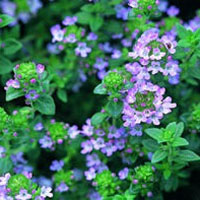Search Healthnotes
Thyme
 © Martin Wall
© Martin WallHow It Works
Many constituents in thyme team up to provide its antitussive (preventing and treating a cough), antispasmodic, and expectorant (thinning the mucus to allow for coughing out) actions. The primary constituents are the volatile oils, which include the phenols, thymol and carvacol.2 These are complemented by the actions of flavonoids. Thyme, either alone or in combination with herbs such as sundew, continues to be one of the most commonly recommended herbs in Europe for the treatment of dry, spasmodic coughs as well as whooping cough.3 Due to the low toxicity of the herb, it has become a favorite for treating coughs in small children.
How to Use It
The German Commission E monograph recommends a cup (250 ml) of tea made from 1/4–1/2 teaspoon (1–2 grams) of the herb taken several times daily as needed for a cough.4 A fluid extract, 1/4–3/4 teaspoon (1–4 ml) three times per day, can also be used. Another alternative is to use a tincture, 1/3–1 teaspoon (2–6 ml) three times per day.
Copyright © 2024 TraceGains, Inc. All rights reserved.
Learn more about TraceGains, the company.
The information presented by TraceGains is for informational purposes only. It is based on scientific studies (human, animal, or in vitro), clinical experience, or traditional usage as cited in each article. The results reported may not necessarily occur in all individuals. Self-treatment is not recommended for life-threatening conditions that require medical treatment under a doctor's care. For many of the conditions discussed, treatment with prescription or over the counter medication is also available. Consult your doctor, practitioner, and/or pharmacist for any health problem and before using any supplements or before making any changes in prescribed medications. Information expires December 2024.











